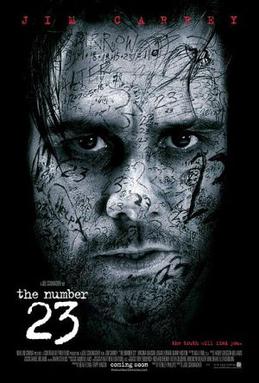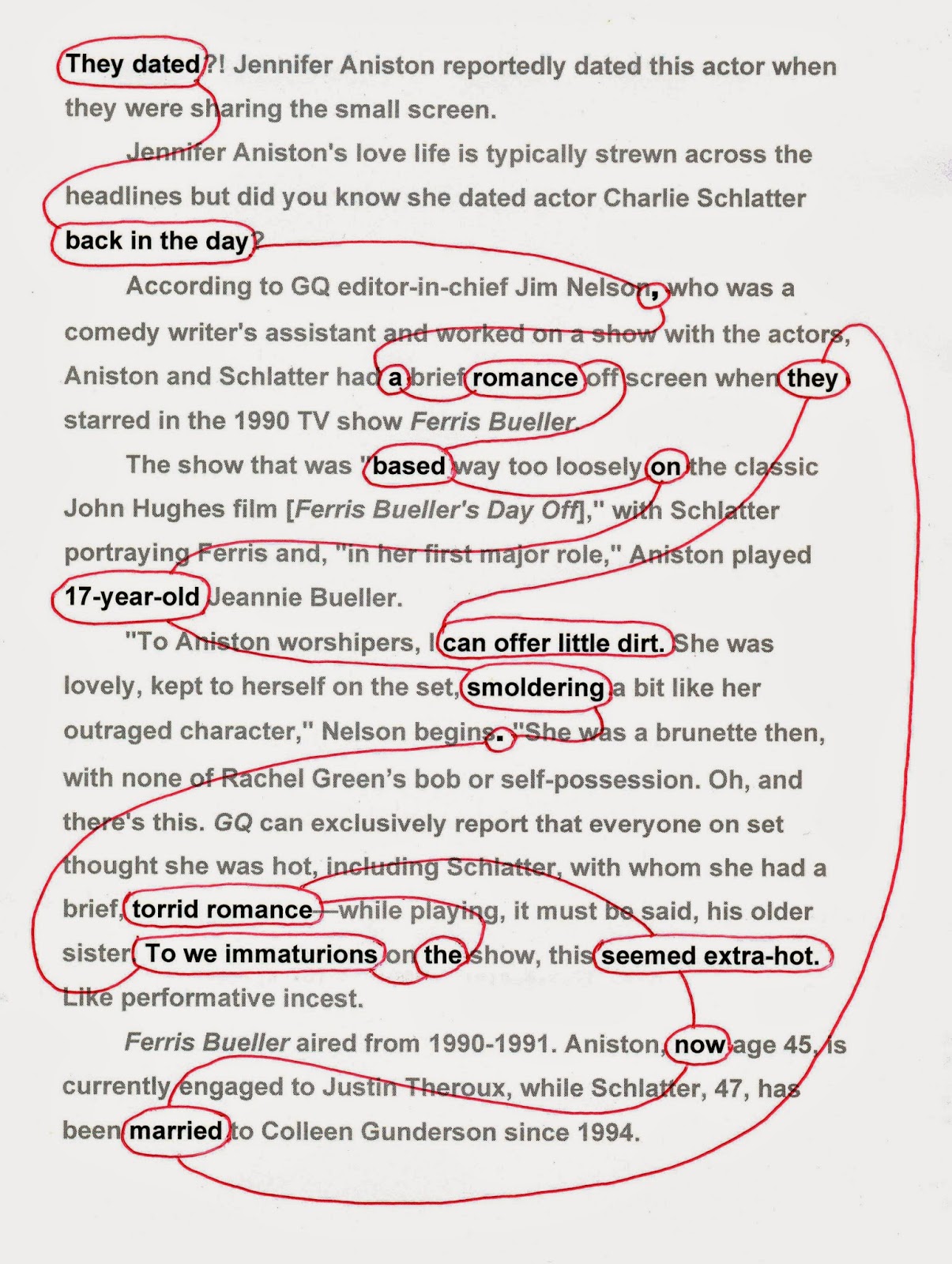Here are today's "official" prompts. Robert Lee Brewer suggests "a location poem," which might be "physical [or] emotional, psychological, metaphysical, or some other kind of word that ends in -al" ( Poetic Asides). Maureen Thorson challenges us today to write "an oldie-but-a-goodie: the homophonic translation. Find a poem in a language you don’t know, and translate it into English based on the look of the words and their sounds" ( NaPoWriMo). This is also called a translitic poem.
The phrase "Day 23" reminds me of The Number 23, a 2007 movie starring Jim Carrey. This psychological thriller portrayed Carrey's character becoming more and more obsessed with the number 23, believing that his life and all events around him are connected to 23 or some permutation of 23, and developing extreme paranoia. I'm writing this after struggling mightily for hours with Maureen Thorson's prompt (described below), and I'm feeling a bit like the hapless hero of that movie. Ack.
 |
| Theatrical Release Poster |
|
I wrote that last paragraph several hours ago, and it's now 5:37 P.M. after an afternoon of dealing with proofs and meetings and poetry selection at the North American Review. I feel a little better because somehow the translitic started to flow, and here it is.
My translitic plays with Rainer Maria Rilke's great poem, "The Panther," given in German to the right. I'll also quote a proper English translation of the poem at the end of this blog post.
The Pain There
Where cutthroat business reigns Shane's block-buying more bargains from Steve,
So mad Gabe warned Dave or Nick. More heat
in those tales of the thousand Steve gave
and hints at the thousands Steve can wield.
Dave's rich gang guesses might make Steve shit.
They're sick in all their claims. Shane, Christ, rat.
This way intense crap hemming more middle
in their business than Gabe will state.
Nick monkeys more shit that overhangs people.
Such a lot lost of Dave getting billed. Insane.
Good dirt there, gloating, and Gabe's plan for Steve
would hurt him personally and sue Shane.
—Draft by Vince Gotera
[Do not copy or quote . . . thanks.] | |
| Der Panther
In Jardin des Plantes, Paris Sein Blick ist vom Vorübergehn der Stäbe
So müd geworden, daß er nichts mehr hält.
Ihm ist, als ob es tausend Stäbe gäbe
und hinter tausend Stäben keine Welt.
Der weiche Gang geschmeidig starker Schritte,
Der sich im allerkleinsten Kreise dreht,
Ist wie ein Tanz von Kraft um eine Mitte,
In der betäubt ein großer Wille steht.
Nur manchmal schiebt der Vorhang der Pupille
Sich lautlos auf. — Dann geht ein Bild hinein,
geht durch der Glieder angespannte Stille —
Und hört im Herzen auf zu sein.
—Rainer Maria Rilke (1902)
[Translation into English below.] |
I think I might have satisfied Robert's suggested "other" locations (emotional, psychological, metaphysical): the poem that arose out of the homophonic translation seems to hint at that metaphysical location where business takes place heartlessly, and the title suggests there is pain there, wherever that is. I feel okay about it how turned and I think I can claim to have mashed up prompts today.
And now to Alan, who says, "Heartsore today, folks, I haven't looked at prompts."
Applied Mathematics
When I was a senior in high school, I took
college calculus taught by a Benedictine
born in Belgium, and old Father John
kept a disciplined classroom and guided us
through calculations and problems
with high estimations of what we
could learn to achieve; to this day,
on occasion, when I see quadratic
equations and some old Greek symbols,
I think of his bad lower teeth
in his open content to show teenagers
how to find meaning in variables.
I don’t apply calculus now as I
average grades or I balance a checkbook
or figure which bill can be paid,
but it’s all algebra at the most
as I might help my kids just a bit
on some homework until they take off
as if they’d just learned how to ride bikes.
But when they were all small I would read to them
so much it never occurs to them now
that their dad, the lit prof who’s to elbows
in dishwater, would take it as quite an honor
to talk about novels they’re reading
at school, look at stories they write, recommend
a good play. Still, I’ve never been asked
to present on a parent’s day,
be the odd professor/poet sat
next to a firefighter, medic, and cop.
So, sums, mainly, I didn’t need to keep
calculus, don’t have it now, but I think
I should learn it all back. I don’t figure x
of a bully’s ineptitude making it more
economical to take away half the job
and to give it to someone who’ll get
a promotion, assuring that that job is done.
I don’t figure n of devoting
attention to something that matters
when fixing it is no concern of its maker —
my three hours of editing seems of more value
than one’s thirty minutes of cutting and pasting.
I don’t figure y of someone’s leaving home
but retaining a presence so that the new
quantity, less than, feels equal,
then only to have a return so that
what should be equal is now greater than.
I was once much more comfortable,
number two pencil in hand and the hard
sibilance of encouragement,
“Yes, Mr. Holmes, you’re correct!”
—Draft by Thomas Alan Holmes [Do not copy or quote . . . thanks.]
Alan, this poem really speaks to me. When I went to the Jesuit high school in San Francisco, my 9th-grade Algebra teacher, Fr. Jacobs, sounds a great deal like this Benedictine calculus teacher of yours. He was a tough old bird, and the grumpiest priest who ever lived, Fr. Jacobs, but we could all tell he cared about us.
I also connect with your feeling here that life was simpler in those days when math would provide a clear answer with an elegant route to get there. But life, or living life, is probably more art than science, and as in writing poems or painting illustrations we don't always know where we're headed, and no one tells us when or if we're correct, but there's nonetheless beauty and reward in it.
Won't you comment, please, friends? To make a comment, look for a blue link below that says Post a comment and click it once. If you don't see that, look in the red line that starts Posted by Vince, then find the word comments and click it once.
Ingat, everyone. ヅ
P.S. Here's the Rilke poem in English.
The Panther
In the Jardin des Plantes, Paris From seeing the bars, his seeing is so exhausted
that it no longer holds anything anymore.
To him the world is bars, a hundred thousand
bars, and behind the bars, nothing.
The lithe swinging of that rhythmical easy stride
which circles down to the tiniest hub
is like a dance of energy around a point
in which a great will stands stunned and numb.
Only at times the curtains of the pupil rise
without a sound . . . then a shape enters,
slips through the tightened silence of the shoulders,
reaches the heart, and dies.
—Rainer Maria Rilke (1902)
Translated by Robert Bly. | | Der Panther
In Jardin des Plantes, Paris Sein Blick ist vom Vorübergehn der Stäbe
So müd geworden, daß er nichts mehr hält.
Ihm ist, als ob es tausend Stäbe gäbe
und hinter tausend Stäben keine Welt.
Der weiche Gang geschmeidig starker Schritte,
Der sich im allerkleinsten Kreise dreht,
Ist wie ein Tanz von Kraft um eine Mitte,
In der betäubt ein großer Wille steht.
Nur manchmal schiebt der Vorhang der Pupille
Sich lautlos auf. — Dann geht ein Bild hinein,
geht durch der Glieder angespannte Stille —
Und hört im Herzen auf zu sein.
—Rainer Maria Rilke (1902) |
|























